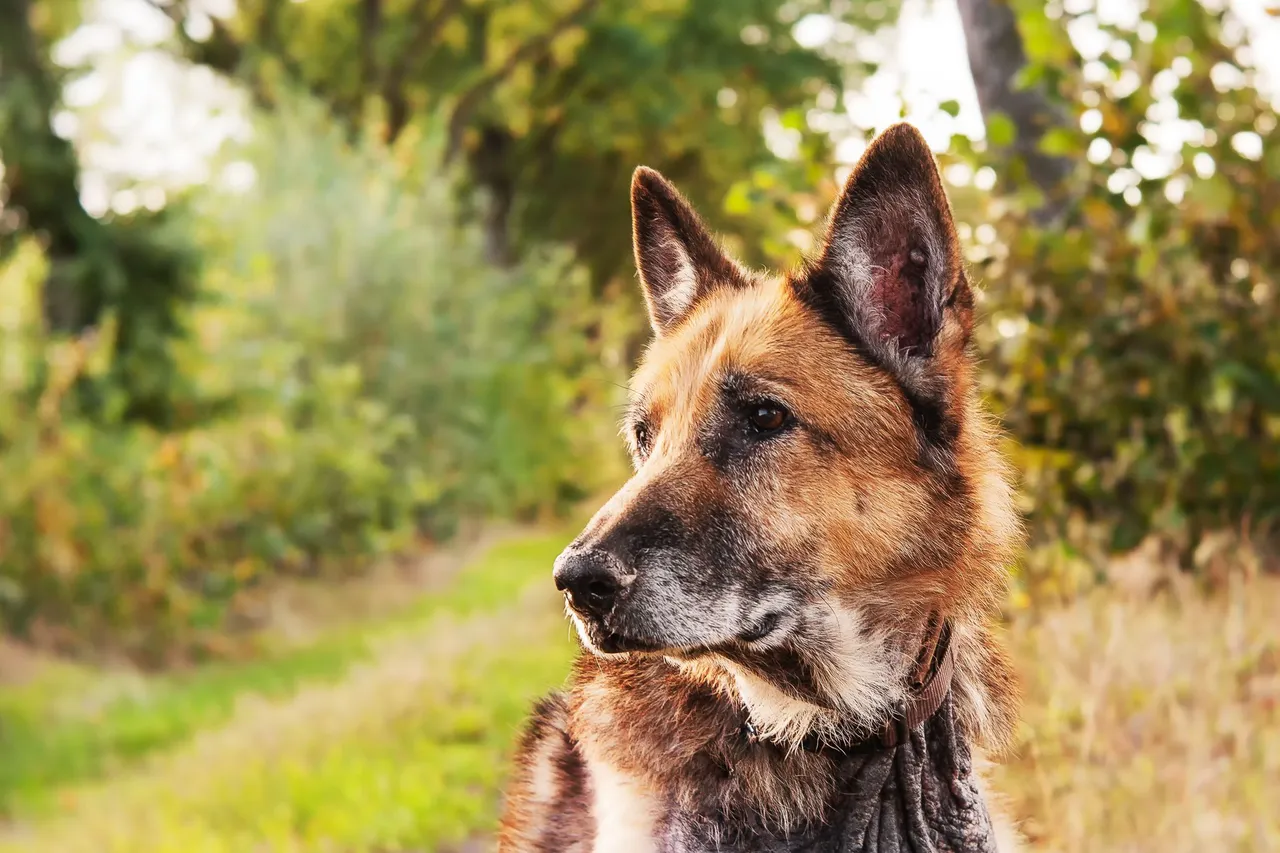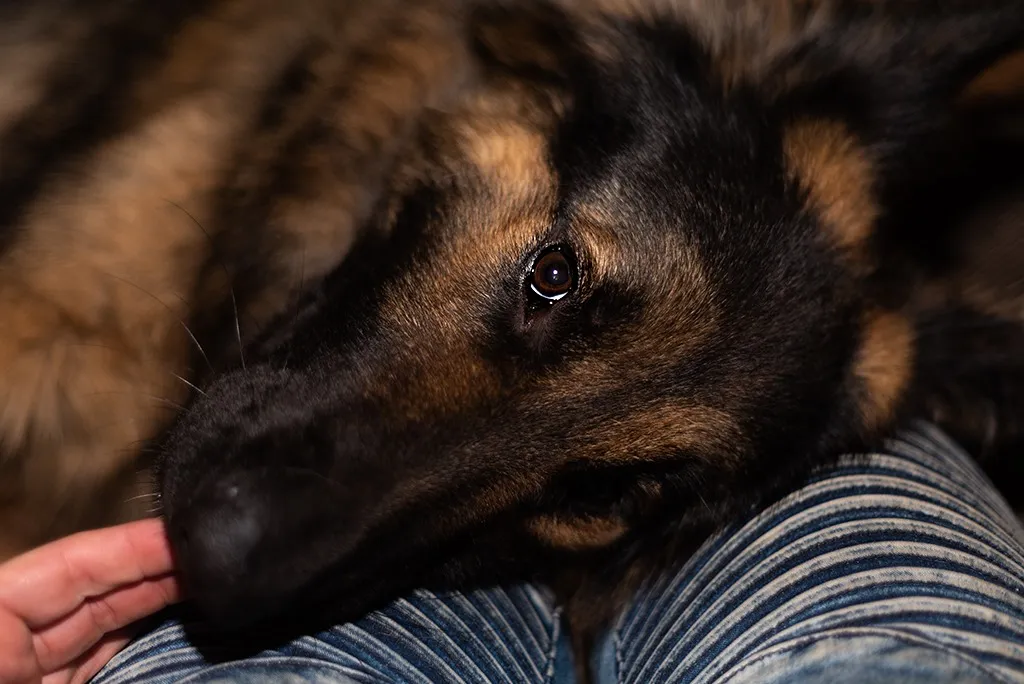
Today during my walk with Skipper I unexpectedly came across another walker. Skipper saw it, was startled by the loud voice and waving movements the walker made, and wanted to react. Because I know from experience what this reaction can be like, I grabbed the kibble in my jacket pocket and held it in front of his nose. At the same time, I blocked his view and made him sit. By keeping him busy, the other walker was able to pass. At least, that was my intention. Unfortunately, this walker did not understand my good intentions and walked straight towards me. He was already putting his hand out to pet Skipper, so I had no choice but to intervene very firmly with a fairly brusque "Please leave that!" When the man lowered his hand I followed it up a bit more friendly, "This dog does not like to be touched by strangers". At this point, the man started asking some questions about Skipper, and the fact that Skipper is a rehomed dog came up. At that moment his attitude changed from admiring to rejecting. And I sighed deeply to myself. Again those age-old prejudices I thought to myself. And yes, the whole conversation did not last 10 minutes but I heard many prejudices again. And that is not for the first time ... Let's list them.
The myths and facts about rehoming dogs/dogs from the shelter
I often hear people consider adopting a dog from the shelter, but just as often they back out at the last moment, run to a (bread) breeder, and spend 1000 euros on a puppy. Now I am not against breeding dogs, as long as this is done responsibly. And unfortunately, that is more often not the case than it is. In the meantime, dogs continue to be dumped by people who can no longer or do not want to take care of them. And all these dogs deserve better! They wait in the shelters or if they are lucky in a temporary home for their golden baskets.
Unfortunately, many persistent myths decide to give a shelter dog a chance more difficult.
Myth 1: All rescue dogs and dogs in shelters have behavioral problems
One of the most common beliefs is that dogs need to be rehomed or have behavioral problems in shelters, which means they are not suitable as pets. This thought naturally prevents many people from adopting such a rescue dog or dog from a shelter. People are afraid of getting a difficult dog, a dog that cannot be trained and cannot adapt.
Fact: Many dogs end up in shelters due to circumstances beyond their control, such as divorces, moves, or financial problems of the previous owner. Many of these dogs are completely healthy, both physically and mentally, and do not have serious behavioral problems. Yes, of course, some dogs may need some training or adjustment time, but that is not so strange. The dog has also experienced something that has a major impact on its life. In addition, you have to get to know the dog, just as the dog has to get to know you. It doesn't matter if this is an older dog from the shelter or a puppy from a breeder. You have to get to know each other, and learn to understand each other! Every dog has its character. Nowadays, many shelters also offer help in the form of training and guidance to help adopters and dogs live together successfully.

Myth 2: Rehoming / Shelter dogs are old and no longer playful
I honestly had to laugh quite a bit when I heard the man say: "He still looks young for his age". When I had regained some control over myself, I asked the man how old he thought Skipper was. And the answer, "Well, at least 10 years old if he's a rehomed dog. He's probably been sold because he's difficult but also doesn't want to play anymore. Yes, all rehomed dogs and dogs in the shelter are old and no longer have the energy to play or be active."
I can understand that this fear scares people who are looking for a young, active dog. But it's so incredibly wrong!
Fact: Dogs of all ages need to be rehomed, and unfortunately end up in shelters, from puppies to senior dogs. This certainly includes older dogs. But they also deserve a golden basket. Often a change in the life of the previous owner is the reason that younger dogs, or even puppies, need to be rehomed, and sometimes it's because of an irresponsible breeding policy that puppies end up in the local shelter. There are so many reasons, but you can say that it's never caused by the dog itself. The dog can hardly ever do anything about it. And for anyone unsure about age, every dog will want to play with you until quite a late age. It is a form of bonding for the dog with its owner.

Myth 3: Shelter dogs are all mixed breed
That's also so nice to hear. Skipper absolutely could not have been a purebred pedigree German Shepherd. Otherwise, he would never have been rehomed. I do know that some people have a strong preference for pedigree dogs. And that they also believe that pedigree dogs will never suffer the same fate as mongrel dogs, or crossbreeds.
Fact: Of course, there are many mixed-blood dogs in mixed-breed shelters, and if you search on websites that rehome dogs, there are also many crossbreeds among them. But, despite the fixed assumption of many people, many pedigree dogs are looking for a new home due to circumstances. There are even specialized breed rescue organizations that rescue dogs of that breed from shelters.
Of course, it's every man for himself, and everyone has the right to make their own choice, but a 'breed' and pedigree have never really interested me. Yes, of course, I have a preference for a certain type of dog. It will be clear that I am a shepherd lover, but of all the shepherds I have had in the meantime, none had a pedigree. I know that 3 of my shepherds were crossbreeds, the other two should be purebred. Without a pedigree I can't prove it, but ... I don't care at all. I have nothing to do with a pedigree, I do have something to do with the dog!

Myth 4: It is more difficult to build a bond with a rescue dog/shelter dog
I often hear that people are afraid that they will get less affection or loyalty from a dog with a backpack that comes to you as a rescue dog/shelter dog, than from a dog that they have raised from puppyhood.
Fact: Dogs are naturally loyal and social, and rescue dogs and shelter dogs are no different from other dogs in this respect. Yes, they may have more acclimatization problems in the beginning. But if they are helped through those first difficult days, they are often very grateful for that second chance at a loving home. With patience and love, you build just as strong a bond with a rehomed dog/shelter dog as with a puppy you get from the nest.
Myth 5: Adoption is more expensive than buying a dog from a breeder
People often assume for convenience that adopting a rehomed dog/shelter dog entails more costs. Because those dogs all have something. If not in terms of behavior, then it is medical, but they have something!
Fact: Adoption costs are generally much lower than the costs of buying a dog from a breeder. There are even shelters that offer a discount on possible medical care for a certain period, and free training sessions. If you add all this up, including the not-insignificant costs for many puppies these days. For example, a Maltipoo for 1000 euros, or how about 2500 euros for a St. Berdoodle. Taking these amounts into account, adopting a rehomed / shelter dog will almost certainly be more financially advantageous.

Why choose a shelter dog?
First of all, you contribute to reducing overpopulation in shelters. By giving a shelter dog a second chance, you directly help to solve this problem and make room for other dogs that need a home.
Every dog, regardless of origin, deserves a loving home. Shelter dogs may well give you more love and loyalty in return than you ever thought possible.
And from my own experience, I can only say that with a little patience, understanding, and love these are the most fantastic dogs. For this I only have to think back to Lexxieboy and Lana, and now of course also Skipper. Lex and Lana were both adopted by us from a shelter, and Skipper came to us as a rehomed dog. All dogs with a backpack, but all three fantastic dogs ... each in their unique way.